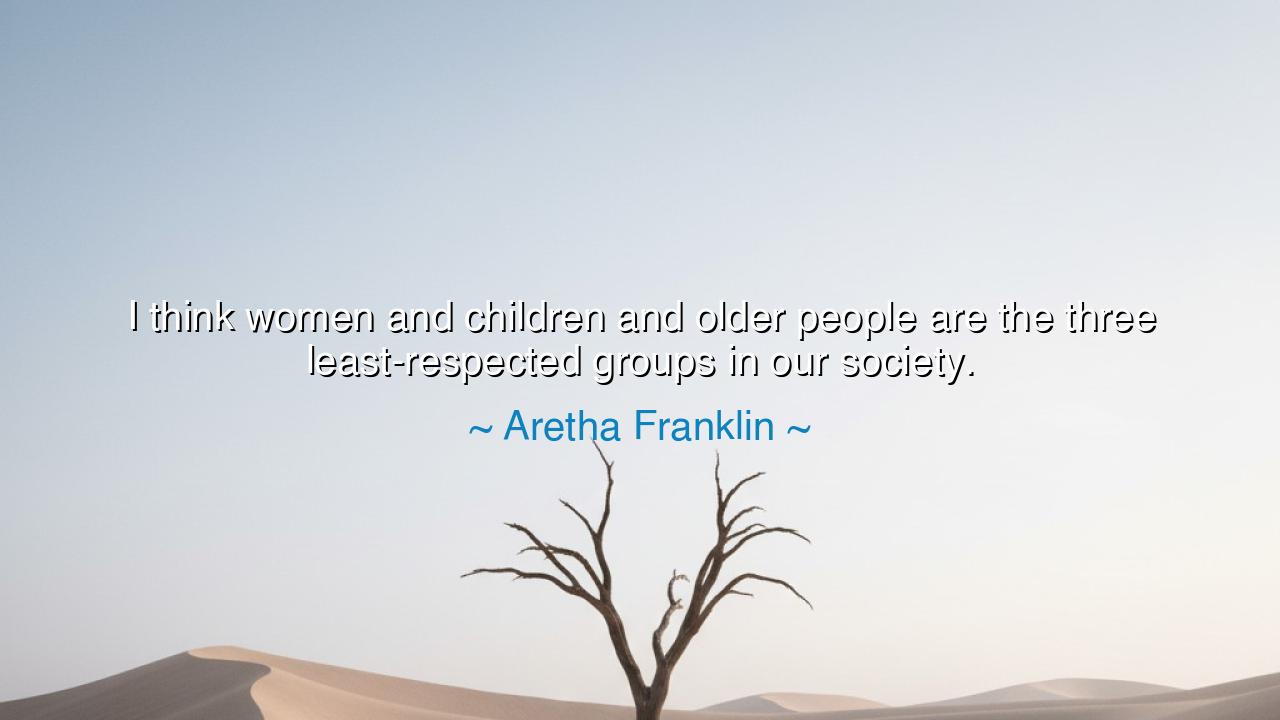
I think women and children and older people are the three
I think women and children and older people are the three least-respected groups in our society.






Aretha Franklin, the Queen of Soul whose voice carried both pain and triumph, once declared: “I think women and children and older people are the three least-respected groups in our society.” These words, though simple in form, bear the weight of centuries. For Franklin, who sang of respect and demanded it for herself and for all, understood that true civilization is revealed not in how it treats the strong and powerful, but in how it regards the vulnerable—the ones least able to defend themselves.
The meaning of her statement strikes at the heart of justice. Women, though creators of life and sustainers of households, have too often been denied equality, silenced in councils of power, and treated as objects rather than partners. Children, the very future of any people, are neglected, exploited, or dismissed as insignificant voices, though their innocence holds the seeds of tomorrow. And older people, the carriers of wisdom, are cast aside in an age that worships speed and youth, their years seen as a burden rather than a blessing. To call these three groups “least-respected” is to expose the blindness of a society that has inverted its values.
History confirms her lament. In ancient Rome, women were denied full citizenship, children were often abandoned or enslaved, and the elderly were revered in words but discarded in practice when they no longer served the state. Even in our modern world, though much has changed, echoes of this disdain remain. One need only look at wage gaps, child poverty, or the isolation of the aged in forgotten institutions to see that Franklin’s words are not merely the cry of her time, but the truth of many ages.
Yet there are also moments when these groups have risen, demanding their rightful respect. Consider the suffragists of the 19th and early 20th centuries—women who endured ridicule, prison, and violence to secure the simple right to vote. Or remember the image of Ruby Bridges, a child who, at six years old, walked through angry crowds to integrate an American school, carrying the weight of justice on her small shoulders. Or think of Nelson Mandela in his later years, an elder who, rather than retreating into bitterness, used his wisdom to guide a nation toward reconciliation. These stories reveal that when the “least-respected” stand up, they become the greatest teachers of courage.
Franklin’s words are also prophetic, for they remind us that a society which dishonors its women, neglects its children, and abandons its elders cannot truly call itself free or civilized. Such a people may build empires of wealth, but they are spiritually impoverished. True greatness is measured not by monuments, but by compassion; not by armies, but by tenderness toward those most easily ignored. A nation that cannot cherish these three groups builds its house upon sand, destined to crumble in the storms of history.
The lesson is urgent and personal. Each of us must examine how we regard the women in our lives—not merely in speech, but in action. We must ask whether we listen to the voices of children, or dismiss them as unworthy. We must look upon the older people around us not as relics, but as living archives of experience, deserving of honor. Respect is not an abstract virtue; it is a daily practice, expressed in listening, protecting, and valuing those whom the world casts aside.
Practical action flows from this teaching. Support laws and movements that uplift women, ensuring equality and safety. Invest in schools, shelters, and programs that defend children, giving them not only survival but the chance to flourish. Visit and cherish older people, learn from their stories, and ensure their dignity is upheld until their final breath. And in your own heart, cultivate the spirit of respect, for without it no song of justice, no structure of liberty, can truly endure.
Thus, let Aretha Franklin’s words ring as more than observation—they are a summons. She, who sang the anthem of Respect, calls us to live it fully. For the true soul of any society will not be found in how it treats the mighty, but in how it honors its women, protects its children, and uplifts its elders. When these three are cherished, then and only then will a people stand tall among the nations, and its song be worthy of eternity.






AAdministratorAdministrator
Welcome, honored guests. Please leave a comment, we will respond soon